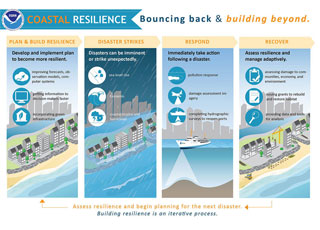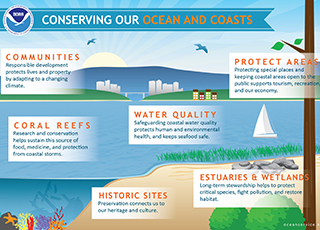National Ocean Service: Positioning America for the Future
Coastal watershed counties were home to 163.8 million people in 2010, approximately 52 percent of the United States population. This number is expected to increase by more than 15 million by 2020. Through the National Ocean Service (NOS), NOAA is the lead federal agency responsible for promoting sustainable, safe, and efficient use of our nation’s coastal, ocean, and Great Lakes resources. NOS’s science-based products and services are positioning America’s coastal communities, economies, and ecosystems for the future of economic growth and environmental change. NOS has identified three priorities that reflect its statutory mandates and missions:

Coastal resilience: preparedness, response, and recovery. In light of increasing threats to our coasts, NOAA’s preparedness, response, recovery, and resiliency activities have become a national priority. From oil spills and vessel groundings to hurricanes and marine debris, NOS provides world-class science and services in support of healthy coastal communities, economies, and ecosystems.

Coastal intelligence. Whether it is the Nation’s nautical charts, environmental monitoring, or socioeconomic tools, NOS and its partners integrate science and services to provide actionable intelligence. Knowledgeable decision makers, both public and private, are able to make informed choices on their use and stewardship of coastal resources.

Place-based conservation. NOS works to conserve marine areas and preserve economic benefits of special places through its coastal management and place-based conservation programs. NOS provides leadership for state and local coastal management efforts across the nation and is the primary conduit for data and services at NOAA to support informed coastal decision making. NOAA’s national marine sanctuaries are America’s primary instrument for place-based conservation of special marine places in offshore areas.
Fiscal Year 2016 Budget Request Highlights:
The FY 2016 President’s Budget request for NOAA’s National Ocean Service is $573,960,000. NOS is positioning America for a future of higher intensity coastal storms, increased demands on the marine transportation system, changing sea levels leading to coastal flooding, and heightened offshore and coastal development. In FY 2016 NOS is proposing critical new investments in resilience of the Nation’s coastal communities to extreme weather events, coastal inundation, climate hazards, and changing ocean conditions. Highlights include:
- Regional Coastal Resilience Grants (+$45.0M). NOAA will significantly expand the Regional Coastal Resilience Grant Program to more fully address a suite of resilience challenges facing all U.S. coastal regions—including community, ecosystem, and economic resilience—within a single, competitive grants program.
- Ecosystem-Based Solutions for Coastal Resilience (+$5.0M). The NOS component of this integrated initiative (with the National Marine Fisheries Service) will help coastal planners integrate ecosystem-based solutions into hazard mitigation, resilient coastal development, and post-disaster rebuilding.
- Capacity to Respond to Extreme Events (+$4.8M). In response to increasing frequency and intensity of coastal inundation events, NOAA will apply a wealth of data and information to improving coastal communities’ decisions on preparing for, responding to and recovering more quickly from these events.
- AmeriCorps Community Resilience Initiative Training (+$2.0M). NOAA will develop and administer a training program for a new AmeriCorps unit to support communities and tribes on vulnerability assessments, resilience program implementation, and coordination with federal resilience efforts.
- Coastal Ecosystem Research and Development (+$4.0M). NCCOS will expand its competitive grant program to fund extramural research and applied science that address coastal ocean issues including harmful algal blooms, hypoxia, and coastal ecosystem assessment.
In addition to these increases, the FY 2016 Budget request maintains robust support for NOS’s partnership-based approaches to generating coastal intelligence, improving the resilience of coastal and great lakes communities and economies, and employing place-based approaches to resource conservation.
 An official website of the United States government.
Here's how you know we're official.
An official website of the United States government.
Here's how you know we're official.


